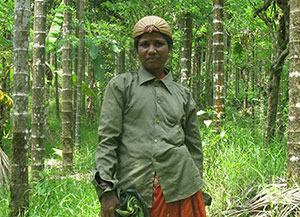Nearly 11 months have passed since Amrita SeRVe was officially launched during Amma’s 60th birthday celebrations. Village clusters have been identified in 27 states of India and work has begun in the seven focus areas of Health, Education, Water and Sanitation, Agriculture, Eco-Friendly Infrastructure, Income Generation and Self-Empowerment.
Many activities are ongoing in all states. Below we provide a snap shot of some of these activities.
[av_partner columns=’1′ heading=” size=’no scaling’ border=” type=’slider’ animation=’slide’ navigation=’dots’ autoplay=’true’ interval=’5′ av_uid=’av-6vxqow9′]
[av_partner_logo id=’40784′ av_uid=’av-6ch1n1l’][/av_partner_logo]
[av_partner_logo id=’40785′ av_uid=’av-5lplzxl’][/av_partner_logo]
[av_partner_logo id=’40786′ av_uid=’av-joqsi1′][/av_partner_logo]
[av_partner_logo id=’40787′ av_uid=’av-4vlgekp’][/av_partner_logo]
[av_partner_logo id=’40788′ av_uid=’av-4ipu5t5′][/av_partner_logo]
[av_partner_logo id=’40789′ av_uid=’av-3xemzop’][/av_partner_logo]
[/av_partner]
In Sawai Madhopur district in Rajasthan, as in many other parts in India, women will often not sit on a chair when men are present. They will keep their faces covered with veils. Amrita SeRVe is endeavoring to empower them through forming self-reliant groups or SRGs that will tackle problems in areas of Health, Education, Agriculture, Water and Sanitation, etc.
In rural India, there are few doctors and nurses. In our villages in the Kondagaon district of Chattisgarh, as in some other states, trained health workers are now regularly conducting medical camps. Training at the Amrita Institute of Medical Sciences will empower more SRG members focusing on health so that they can themselves solve basic problems in the community.
Open defecation, where it exists, contaminates the environment and causes many health problems. And where toilets exist, often the waste water ends up polluting water bodies. Our goal is to address these issues as we begin to solve the problem of sanitation. In our villages in Khurda district of Odisha and in some other states, the quest has already begun.
In many rural places, women and children have to fetch water from faraway places. In our tribal villages in Wayanad district in Kerala, for instance, people needed to haul water from the bottom of a hill for their daily needs. Now wells have been dug and Amrita SeRVe has made arrangements to bring relief to this community.
Planting trees, making check dams, and digging ponds – all these help to harvest rainwater and recharge ground water. In Ransai village in Maharashtra, the goal is that the well that now dries up during the summer season will have water all year long. The first step is to raise awareness, so that all villagers enthusiastically come together and participate in watershed projects.
[av_partner columns=’1′ heading=” size=’no scaling’ border=” type=’slider’ animation=’slide’ navigation=’dots’ autoplay=’true’ interval=’5′ av_uid=’av-3agqhbd’]
[av_partner_logo id=’40797′ av_uid=’av-2w2isdl’][/av_partner_logo]
[av_partner_logo id=’40798′ av_uid=’av-2nbmmix’][/av_partner_logo]
[av_partner_logo id=’40799′ av_uid=’av-21y3v55′][/av_partner_logo]
[av_partner_logo id=’40800′ av_uid=’av-1la12ix’][/av_partner_logo]
[av_partner_logo id=’40801′ av_uid=’av-13c3wbt’][/av_partner_logo]
[av_partner_logo id=’40802′ av_uid=’av-vj15mx’][/av_partner_logo]
[/av_partner]
Raising awareness is also the first step to making the transition to organic agriculture. Farmers from many of our villages, such as in Uttar Pradesh and Gujarat, are being trained to adopt natural ways of farming. How wonderful it would be, if the whole village completely stopped the use of expensive and harmful chemical fertilizers and pesticides.
Over 30% of the people in Bihar are illiterate. The Amrita SeRVe education team is committed to changing that. It is focusing both on adult literacy and back-to-school camps especially for children who have recently discontinued studies. For those in school, free tuition support is being provided so that they may do well in studies.
Free tuition classes are also on going in Madhya Pradesh and many other states. The tuition teacher is often a young graduate from the village itself, and sometimes has students from many different classes. Innovative learning programs on tablets help as the students are empowered to learn together in groups and on their own.
For youth who have no jobs, Amrita SeRVe is providing support through vocational training. The goal is to check migration and provide opportunities for income generation in the village itself. Using local resources and making value-added products, especially from agricultural produce has begun in our villages in many states such as Tamil Nadu and Karnataka.
In villages such as Udalaka and Asthal in Uttarakhand, Amrita SeRVe is continuing the work of the post-disaster reconstruction and relief teams … re-building communities and lives. Several people from these villages met Amma for the first time when they traveled to Amritapuri during Amma’s 60th birthday celebrations. Amma continues to remain a strong presence in their lives.
“I have only one desire now – to meet Amma soon,” say others, like Neetu Devi. Perhaps the opportunity will come soon – during Amma’s 61st birthday celebrations. Amrita SeRVe is now serving in 27 states of India. Villagers everywhere are making plans to come to Amritapuri for Amma’s darshan. The miracle of Amma’s love is starting to change their very lives.
When Amma visited Ranchi in Jharkhand in 2006, the villagers in Dev Gain met Amma for the first time. “Not a day goes by when I don’t remember Amma,” says Bharath. Today Bharath coordinates all Amrita SeRVe activities in his village, chosen as one of Amma’s 101 villages from all over India.
– Dass

